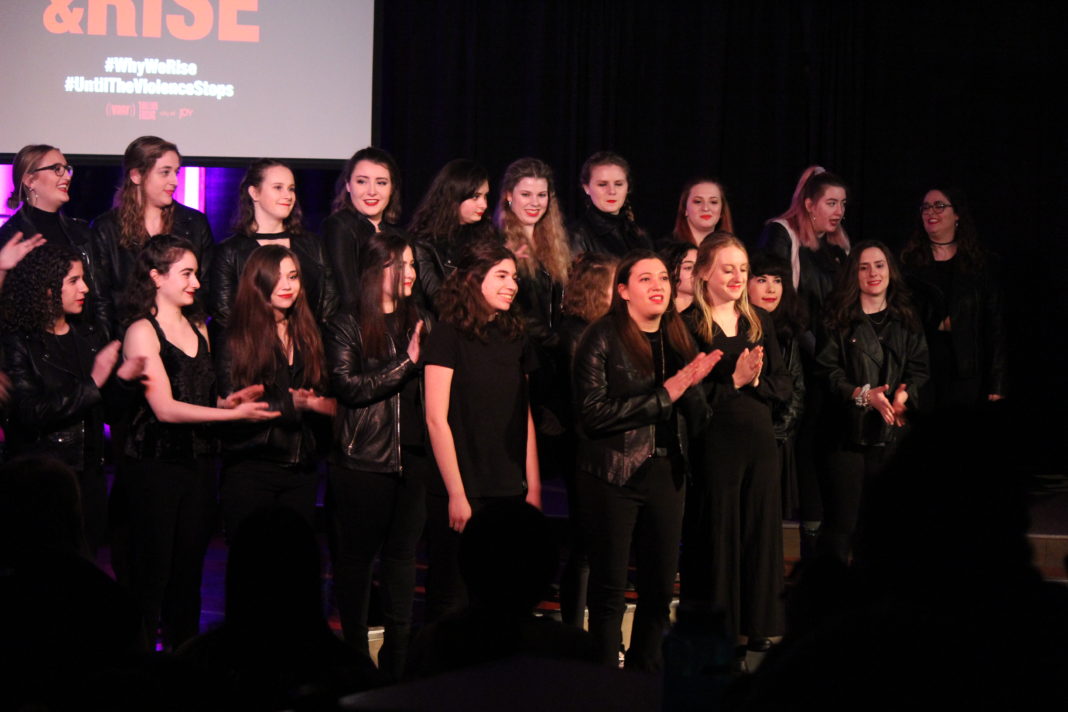The female body and form has been shaped, created and re-enacted throughout various mediums of art and expression. Whether it be as a sign of purity and beauty, or one of sin and consternation—the woman’s form has always been under the analytical gaze. And yet, The Vagina Monologues takes this concept to a whole other level of understanding.
Last weekend, Muhlenberg students performed Eve Ensler’s The Vagina Monologues. A production that has been performed for a couple of years now, in which students come together to celebrate and perform the “taboo” subject that is the vagina.
Lindsay Tata ‘22 describes the experience as one of a kind.
“In a patriarchal society women are taught to identify against themselves when they view art produced by men depicting their version of a woman. To have the students see a production written by women, about women, really works to illustrate the true physical, mental and emotional state of women,” said Tata.
Tata was a reader in “The Vagina Workshop,” which was consistent of various dialogues regarding the vagina as an unknown territory.
It was said that “I found it quite unsettling at first, my vagina. Like the first time you see a fish cut open and you discover this other bloody complex world inside, right under the skin.”
Such imagery and language, that are often considered taboo in various public and private settings—language that Ensler argues need to be discussed out in the open.
“I bet you’re worried. I was worried.” Enser laments in her work, “I was worried about vaginas. I was worried about what we think about vaginas, and even more worried that we don’t think about them.”
Vaginas though, were not the only point of focus during the production. “I was playing a transgender woman,” Arielle Moss ‘20 remarks. “[It was] a challenge for me as I am cisgender, so I was scared that I would not be able to properly convey the message to the audience. Each woman in my scene shows the traumas they experienced as a transgender female and the desire they have to be treated for the women that they truly were born to be.”
The piece she performed in, “They Beat The Girl Out Of My Boy…Or so They Tried,” featured five women lamenting the struggles and experience of being transgender. The language used encompassed the change and desire, one whispers “And my voice, practice practice. It’s all about resonance…Men are monotone and flat. Southern accents are really excellent…” at which another woman answers, “and my vagina is so much friendlier. I cherish it. It brings me joy.”
“They wanted to be seen as women even though they were not born with vaginas, said Moss. “Through rehearsals, each of us were able to connect with our roles, and hoped we brought the message to the audience. In The Vagina Monologues, there are some scenes where women hate the vagina with which they were born. My scene was different, as the characters all desired to get a vagina, even though this desire sometimes results in violence.”
The theme of revealing oneself weaves throughout the pieces, from “The Vagina Workshop,” to “Hair,” referring to the hair on the vagina, and how much pressure is often put on removing it. The character laments on her choice of following her husband’s insistence:
“He got to shave my vagina. It was like a therapy bonus prize. He clipped it a few times and there was a little blood in the bathtub…later, when my husband was pressing against me, I could feel his spiky sharpness sticking into me, my naked puffy vagina. There was no protection. There was no fluff.”
The realisation is painful, “I realized then that hair is there for a reason — it’s the leaf around the flower, the lawn around the house. You have to love hair in order to love the vagina. You can’t pick the parts you want. And besides, my husband never stopped screwing around.”
The Vagina Monologues, as in past productions, is a must-see performance of gender and physical bodies in dialogue. Truly a necessity for all to watch, and ultimately, to understand with an open mind.
“For those who identify as women it’s an opportunity,” Tata explained, “to hear about topics that aren’t discussed or facilitated in public or even private life. For those who identify as men it gives them the chance to see a glimpse into the minds and the experiences of their mothers, sisters, and friends.”
Lauren Mazur, member of the class of 2019, serves as the co-editor of the Arts & Culture section. Now a Junior, she is a double major in English and Music as well as a part of the Pre-Law program.






















